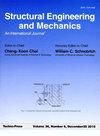高速粉末压实:实验调查,建模和优化
IF 3
4区 工程技术
Q2 ENGINEERING, CIVIL
引用次数: 0
摘要
采用气爆成形技术对铝粉进行了动态压实研究。实验在4种不同的总爆轰压力条件下进行。研究了初始粉末质量和颗粒粒度对压实试样生坯密度和强度的影响。采用响应面法(RSM)表征了上述粉末设计参数与试样最终特征之间的关系。采用分组数据处理方法(GMDH)算法建立人工神经网络(ANN)模型,预测压实试件的绿密度和绿强度。利用期望函数进行多目标优化。用三个新的实验和人工神经网络模型验证了得到的最优解。在理想度为1的最优设置下,得到的生坯密度和生坯强度分别为2714 kg m3和21.5 MPa,与预测值非常接近。本文章由计算机程序翻译,如有差异,请以英文原文为准。
High-velocity powder compaction: An experimental investigation, modelling, and optimization
Dynamic compaction of Aluminum powder using gas detonation forming technique was investigated. The experiments were carried out on four different conditions of total pre-detonation pressure. The effects of the initial powder mass and grain particle size on the green density and strength of compacted specimens were investigated. The relationships between the mentioned powder design parameters and the final features of specimens were characterized using Response Surface Methodology (RSM). Artificial Neural Network (ANN) models using the Group Method of Data Handling (GMDH) algorithm were also developed to predict the green density and green strength of compacted specimens. Furthermore, the desirability function was employed for multi-objective optimization purposes. The obtained optimal solutions were verified with three new experiments and ANN models. The obtained experimental results corresponding to the best optimal setting with the desirability of 1 are 2714 kg m3 and 21.5 MPa for the green density and green strength, respectively, which are very close to the predicted values.
求助全文
通过发布文献求助,成功后即可免费获取论文全文。
去求助
来源期刊

Structural Engineering and Mechanics
工程技术-工程:机械
CiteScore
3.80
自引率
18.20%
发文量
0
审稿时长
11 months
期刊介绍:
The STRUCTURAL ENGINEERING AND MECHANICS, An International Journal, aims at: providing a major publication channel for structural engineering, wider distribution at more affordable subscription rates; faster reviewing and publication for manuscripts submitted; and a broad scope for wider participation.
The main subject of the Journal is structural engineering concerned with aspects of mechanics. Areas covered by the Journal include:
- Structural Mechanics
- Design of Civil, Building and Mechanical Structures
- Structural Optimization and Controls
- Structural Safety and Reliability
- New Structural Materials and Applications
- Effects of Wind, Earthquake and Wave Loadings on Structures
- Fluid-Structure and Soil-Structure Interactions
- AI Application and Expert Systems in Structural Engineering. Submission of papers from practicing engineers is particularly encouraged.
 求助内容:
求助内容: 应助结果提醒方式:
应助结果提醒方式:


